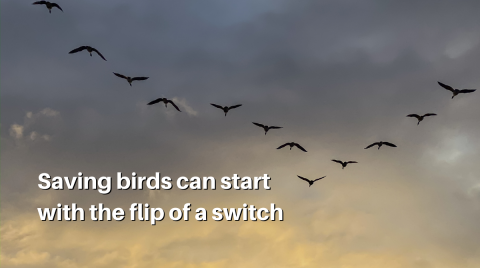
Many of these birds fly at night, making them very sensitive to bright lights coming from cities, homes and businesses. These artificial lights can cause birds to crash into windows and buildings, and leave them disoriented and vulnerable.
“Vulnerable to what?”
Well, when birds pass over big, bright cities at night, they are also in the middle of a constant battle for survival. They are trying to save every bit of energy that they have to evade threats and still be able to survive and produce chicks at the end of their journey or during the next breeding season.
Think of it like this: you are on a long drive with a specific destination in mind. You have just enough gas to get there if you stay on course, but as you are driving, you notice extra road signs giving you confusing directions.
“Where are these signs coming from?” you think to yourself.
But, alas, the directions bewilder you just enough that you get lost and drive around in circles for a while. You may get back on track, though due to this mishap you are now exhausted and almost out of gas with little hope to reach your destination.
Does that sound a little scary? This is the reality of what millions of migratory birds face as they travel through cities all over the world, including Colorado Springs. The good news is, we can help make their journey a little bit easier by simply turning off many of our outdoor lights and making small adjustments with other essential lights where we can.
Lights Out Colorado is a program that aims to help migratory birds in just this way. They and other organizations, such as BirdCast, have put together helpful recommendations for steps you can take to reduce your impact on light pollution.
- Turn off all non-essential lights from dusk until dawn each night, especially during migratory season. For Colorado this is from April through May, and August through September.
- Refrain from using outdoor landscape lighting. Try to avoid outdoor spotlights as well.
- When lights must be on inside (because we still have to see) be sure to close blinds or get window coverings. This way indoor lights do not shine into the night sky.
- When they need to be used, make sure lights have a clear purpose.
- If there are lights you deem to be essential, there are ways that you can limit their impact.
- Angle lights down, so they shine at the ground and not the sky. This can also be done by adding light shields to your bulbs, allowing the light to be guided away from the sky or trees.
- Adopt motion detectors or sensors as well as power timers so that lights are only on when you need them, and not on continuously throughout the night. This is a way to save money on electricity as well.
- Use low light levels and warmer color lights.
With more people helping to protect migratory birds, we can make a huge impact. Many species are in decline, and it is more important now than ever to help wildlife where we can. With most wildlife facing challenges from loss of habitat, noise and light pollution, human interactions and habitat fragmentation, we need to make positive changes where we can, and educate others as we go. By educating ourselves about conservation issues, we can pass on the passion of environmental stewardship to others and to future generations.
Ava Johnson is a Biological Technician for the City of Colorado Springs Trails, Open Space & Parks (TOPS) program. She enjoys spending her time climbing and backpacking, as well as taking road trips and sharing her passion for wildlife with others.
This content first appeared in The Gazette’s Cheyenne Edition and is reprinted here with permission from Pikes Peak Newspapers. It is part of a monthly column titled, “Ranger Ramblings."
